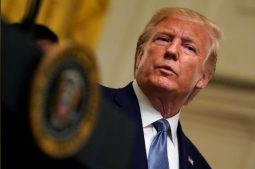US President Joe Biden has told the United Nations General Assembly (UNGA) that the world was an inflection point as he highlighted ending the COVID-19 pandemic and tackling climate change as key areas of focus while slamming the rise of authoritarianism.
This was Biden’s first address to the Assembly after replacing former President Donald Trump in January. He spoke after the Secretary-General presented his state of the world report calling for the world to wake up as it continued to move in the wrong direction while teetering on the edge of the abyss.
Antonio Guterres has given the world an F for Ethics.
Analysis of Biden’s UN General Assembly address with Sherwin Bryce-Pease:
It was a vastly different tone struck by Biden compared to his predecessor – asserting his country’s re-engagement with the world from rejoining the World Health Organisation and Paris Climate Change accords to efforts to boost COVID-19 vaccine supplies globally.
“Instead of continuing to fight the wars of the past, we are fixing our eyes and devoting our resources to the challenges that hold the keys to our collective future. Ending this pandemic, addressing the climate crisis, managing the shifts in global power dynamics, shaping the rules of the world on vital issues like trade, cyber and emerging technologies and facing the threat of terrorism as it stands today. We’ve ended 20 years of conflict in Afghanistan. And as we close this period of relentless war, we’re opening a new era of relentless diplomacy, of using the power of our development aid to invest in new ways of lifting people up around the world,” Biden said.
In an effort to affirm the tenets of democracy, he argued that governments by the people and for the people was still the best way to deliver for all the world’s people; he indicated that US military power was a tool of last resort, warning that the world most pressing issues could not be resolved through the force of arms while urging the establishment of a global health threat council that was armed with tools to monitor and identify emerging pandemics so that the world could take immediate action.
Highlighting three pillars ahead of his COVID-19 summit on Wednesday – saving lives now, vaccinating the world and building back better.
“Bombs and bullets cannot defend against COVID-19 or its future variants. To fight this pandemic, we need a collective act of science and political will. We need to act now to get shots and arms as fast as possible and expand access to oxygen test treatments to save lives around the world.”
“In April, I announced the United States will double our public international financing to help developing nations tackle the climate crisis. And today, I’m proud to announce that we’ll work with Congress to double that number again, including for adaptation efforts. This will make the United States a leader in public climate finance with our added support, together with increased private capital and other from other donors, will be able to meet the goal of mobilizing one hundred billion dollars to support climate action in developing nations.”
Earlier, UN Chief Antonio Guterres painted a bleak picture of a world on the precipice – from the pandemic and climate emergencies to upheaval from Afghanistan to Ethiopia and Yemen – as he pointed to vaccine inequity as a tale of global failure.
“On the one hand, we see the vaccines developed in record time – a victory of science and human ingenuity. On the other hand, we see that triumph undone by the tragedy of a lack of political will, selfishness and mistrust. A surplus in some countries. Empty shelves in others. A majority of the wealthier world vaccinated. Over 90 percent of Africans still waiting for their first dose. This is a moral indictment of the state of our world. It is an obscenity.”
He urged bridging action on 6 Great divides – peace and stability, gaps in climate ambition, growing divides between rich and poor, gender equity, digital access and among generations as the UN seeks to elevate the role of youth in resolving global challenges.






